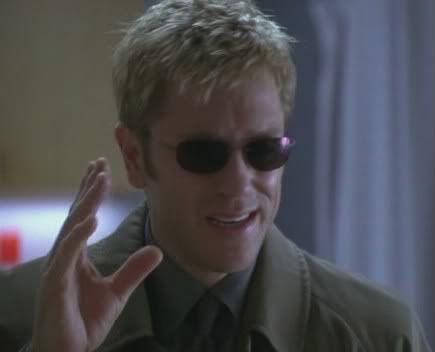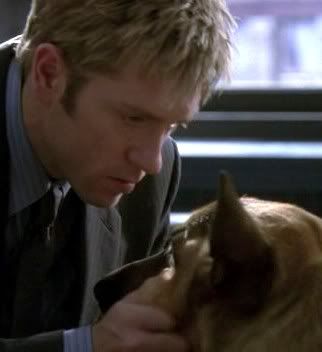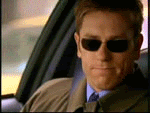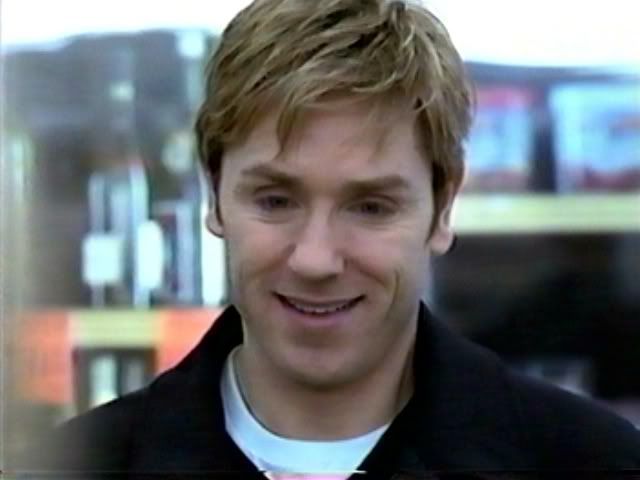|
|
Post by maggiethecat on Apr 6, 2007 15:46:05 GMT -5
Since I spent Good Friday (for my sins, for my sins) balancing two (!) bank statements and wading through and paying a disgustingly high stack of bills, I though I’d relax with a little classic Blind Justice brain candy. Here’s a question we can chew over for a while. While we’ve covered aspects of it before (and, might I say, at extreme length), we do have new members for whom "Up on the Roof" is recent and fresh. (Aah, the good old days.  ) Why did Jim never tell the squad what happened at the bank? Oh, we can all come up with any number of reasons, and in the proverbial heartbeat: He didn’t want to get into it; he wanted to leave Terry and his action (or lack of action) in the past; he wanted to make a fresh start and not burden his new colleagues -- for whom his mere presence was an irritant -- with old baggage. Maybe he was proud and prickly and just plain didn’t think it was anyone’s business but his. Or maybe because finally telling the truth would re-open the Internal Affairs investigation and that would mean more attention, more reporters, and less chance that he’d be allowed to just do his job. But when you think about it . . . it would have been one hell of a great card to play. (New members, please note: On this board we don’t cite fanfic in the analysis threads, as tempting as it may be!) Marty might have had a new understanding, and maybe even a little sympathy. Karen might have cut Jim a little more some slack if for no other reason than knowing he was coming off not only a life-altering trauma, but the unsettling (to say the least) experience of trusting a partner who couldn’t be trusted. Karen questions Jim, and all she gets is his oblique remark about Terry “not stepping up.” Even Marty, never the most sensitive of souls, picks up on the "bad blood" between them. So we do have evidence that the squad suspected something. I wonder why none of them ever followed up on it? Do you think Karen figured it out? Or was Jim’s silence [wink, wink] a subtle and clever ploy on the part of the writers? We were allowed to know something about Dunbar that only Christie and Terry knew, and that’s always a satisfying position for the viewer. Thoughts, anyone?  |
|
Deleted
Deleted Member
Posts: 0
|
Post by Deleted on Apr 6, 2007 15:50:40 GMT -5
Since I spent Good Friday (for my sins, for my sins) balancing two (!) bank statements and wading through and paying a disgustingly high stack of bills, I though I’d relax with a little classic Blind Justice brain candy. Here’s a question we can chew over for a while. While we’ve covered aspects of it before (and, might I say, at extreme length), we do have new members for whom "Up on the Roof" is recent and fresh. (Aah, the good old days.  ) Why did Jim never tell the squad what happened at the bank? Oh, we can all come up with any number of reasons, and in the proverbial heartbeat: He didn’t want to get into it; he wanted to leave Terry and his action (or lack of action) in the past; he wanted to make a fresh start and not burden his new colleagues -- for whom his mere presence was an irritant -- with old baggage. Maybe he was proud and prickly and just plain didn’t think it was anyone’s business but his. Or maybe because finally telling the truth would re-open the Internal Affairs investigation and that would mean more attention, more reporters, and less chance that he’d be allowed to just do his job. But when you think about it . . . it would have been one hell of a great card to play. (New members, please note: On this board we don’t cite fanfic in the analysis threads, as tempting as it may be!) Marty might have had a new understanding, and maybe even a little sympathy. Karen might have cut Jim a little more some slack if for no other reason than knowing he was coming off not only a life-altering trauma, but the unsettling (to say the least) experience of trusting a partner who couldn’t be trusted. Karen questions Jim, and all she gets is his oblique remark about Terry “not stepping up.” Even Marty, never the most sensitive of souls, picks up on the "bad blood" between them. So we do have evidence that the squad suspected something. I wonder why none of them ever followed up on it? Do you think Karen figured it out? Or was Jim’s silence [wink, wink] a subtle and clever ploy on the part of the writers? We were allowed to know something about Dunbar that only Christie and Terry knew, and that’s always a satisfying position for the viewer. Thoughts, anyone?  PLENTY, but I have to run and perform The Seven Last Words for Good Friday. I'll be back!......... |
|
|
|
Post by Chris on Apr 6, 2007 22:30:31 GMT -5
I have spent the entire night ( :  reading through the threads about UOtR and why Terry shot himself. I will now go to bed and get some sleep (it's 5.30 am, yawn!!!) and also chew on your question: Here’s a question we can chew over for a while. ...... Why did Jim never tell the squad what happened at the bank? Thoughts, anyone?  I might come up with some thoughts later today since it's a very interesting point, why didn't he?? Just need a little sleep first..... - Chris  |
|
|
|
Post by mlm828 on Apr 7, 2007 15:06:21 GMT -5
I have a few theories (of course).
The most obvious is that it was a case of "cops looking out for cops" (in the words of our least favorite whiny blonde, Mary Beth). But I think this is unlikely, based on what we see in the Pilot and Up on the Roof.
Another possibility is that Jim didn't immediately remember what happened, and by the time he did, he felt it was too late -- for any number of reasons, such as: he had more pressing issues to deal with; he thought it was too late to change his statement; he wanted to put the whole business behind him; or -- supply your own theory. Or maybe he did remember, but didn't trust his memory at first. Or he didn't want to believe what he remembered.
Another possibility is suggested by Jim's comment at the end of Up on the Roof, to the effect that cops will find out what really happened. Maybe some people in the NYPD did know what happened but decided to keep quiet about it. We can assume the NYPD got a lot of good PR from Jim's heroism. Disclosing Terry's role would have tarnished that. Maybe Jim knew that raining on the NYPD's parade, so to speak, wouldn't help him get his job back, so he decided to keep quiet about what really happened. Or maybe deals were struck with both Terry and Jim. Terry got to keep his reputation in return for keeping quiet (not that Terry would have wanted the story to come out, anyway). And maybe keeping quiet about what happened at the bank was part of the deal which allowed Jim to go back on the job.
As to why Jim didn't tell the other members of the squad, I think it had to do with trying to earn his place there. With everything else he had going against him, he would not want to be viewed as someone who would bad-mouth his former partner, even if there was a very good reason to do so. And would it really have been in character for Jim to appeal to their sympathy, even indirectly?
|
|
|
|
Post by rducasey on Apr 7, 2007 17:21:43 GMT -5
I have a few theories (of course). As to why Jim didn't tell the other members of the squad, I think it had to do with trying to earn his place there. With everything else he had going against him, he would not want to be viewed as someone who would bad-mouth his former partner, even if there was a very good reason to do so. And would it really have been in character for Jim to appeal to their sympathy, even indirectly? Karma Martha for these theories. I especially agree with your last one. Good point. |
|
|
|
Post by Chris on Apr 7, 2007 18:43:45 GMT -5
This is of course speculating as we don't know what happened after Jim got shot, but to me it would seem plausible that he had some memory-loss for a while after the shooting. So that would have given Terry time to come up with his story and, as MLM said, Jim went along with it for whatever reason, even after he remembered what REALLY happened. Having gone along with Terry's story consequently means that he had to stick to it in his new squad too. If he told them the real story he might get some understanding and sympathy from his new colleagues but it might backfire and he would be tagged as someone who's bad-mouthing his former partner, blaming HIM for getting shot - not the best way to start a relationship with your new squad.  Also - Dunbar really doesn't like to talk about what happened (or talk about anything else, for that matter  ) and if he told them, there would be a lot of questions that he really didn't want to answer. He wants to keep a lid on it and move on, that might give him nightmares at night but he can at least pretend like it doesn't affect him during the day. And, the more people that knows what happened that day, the bigger the risk of the truth getting out, which is something he doesn't want at all. Like Maggie said, that would cause the investigation to be opened up again and more public attention which he certainly didn't want. After all, he is not a "Glory-hound"  This is also a valid point: Or was Jim’s silence [wink, wink] a subtle and clever ploy on the part of the writers? We were allowed to know something about Dunbar that only Christie and Terry knew, and that’s always a satisfying position for the viewer. Maybe this was to be explored in later episodes had the show not been canceled  Karen questions Jim, and all she gets is his oblique remark about Terry “not stepping up.” Even Marty, never the most sensitive of souls, picks up on the "bad blood" between them. So we do have evidence that the squad suspected something. I wonder why none of them ever followed up on it? Do you think Karen figured it out? I do believe Karen figured it out. She knows Jim and knows that he only tells people what he thinks they need to know and nothing more than that. She also knows that Terry shot himself and she is a detective, of course she can connect the two and figure out the rest. So, yes, she knows. As for Marty and Tom never following up on it? The two of them might discuss what happened but I don't think they would ask Jim directly. Marty's and Jim's relationship is not the kind where Marty could ask something like that, he might be mean and insensitive at times, but this is different. And Tom, nah, I don't think he cares that much about what happened in the past, that was then and this is now, end of story. Marty could ask Karen but I think he knows that she wouldn't tell him anyway, She and Jim are partners and therefore she would not betray Jim's trust by telling Marty what she knows or have guessed, if Jim wants it to be a secret it stays a secret. - Chris  |
|
|
|
Post by krissie on Apr 8, 2007 12:55:34 GMT -5
I've been trying to work out why Jim would have said nothing. I've come up with a few ideas, but I don't feel convinced by any of them. The best answer I can come up with is that Jim obviously has real problems telling anyone anything. He plays everything very close to his chest, doing his best to deal with each and every problem himself. He doesn't tell anyone about things that bother him. He doesn't let anyone in. But, while I can understand Jim taking that attitude for personal issues, Terry freezing up goes beyond being a spat between two partners, and becomes a professional one. Surely, there would have been some kind of inquiry into the shooting. Questions would have been asked, so why didn't the truth come out? If someone in authority had asked Jim, after the shooting, what had happened, would Jim have told them? I would like to think so, because his choosing to keep silent seems to be irresponsible. Would you choose to keep someone on the job when you know full well that they don't 'have your back'? So... next question. Did anyone ask Jim? Or had all the questions been answered to other people's satisfaction by the time Jim came around? Or, maybe, did some well-meaning person think that they could get all the information they needed from Terry, without bothering Jim? But then... Wouldn't someone have noticed that the robber had been shot with Terry's gun, not Jim's? Wouldn't that have rung alarm bells somewhere? What kind of story would Terry have come up with to explain that away? Who would gain -- other than Terry -- from covering up the real facts of the shooting? Ooooo. Conspiracy theories!  (And, if I go any further down that route, I might just as well sit down and write a fan fic!  ) Why didn't Jim tell Karen and the rest of the squad? I agree with mlm here. I think Jim kept quiet because Jim wanted to be accepted on his own merits; whatever happened had happened. If Jim walked in and said, "Oh, by the way, my ex-partner is a lying scumbag who froze at the crime scene", he'd come across as being really whiny. No matter that the shooting has had life-long consequences for Jim, it is still something in the past for everyone else. I suspect, though, that had the squad encountered Terry later on in the series, and not in the fourth episode, Jim might have told Karen what happened. And, yes, I agree with Chris. I think Karen figured out for herself what happened. Krissie |
|
|
|
Post by Chris on Apr 8, 2007 14:18:27 GMT -5
Who would gain -- other than Terry -- from covering up the real facts of the shooting? Ooooo. Conspiracy theories!  (And, if I go any further down that route, I might just as well sit down and write a fan fic!  ) Go ahead!!!  If Jim walked in and said, "Oh, by the way, my ex-partner is a lying scumbag who froze at the crime scene", he'd come across as being really whiny. Probably not the best idea!! I suspect, though, that had the squad encountered Terry later on in the series, and not in the fourth episode, Jim might have told Karen what happened. I agree  - Chris  |
|
|
|
Post by Colorado girl on Apr 8, 2007 17:18:13 GMT -5
Maybe Jim was thinking of the ramifications to Terry's family. After all Jim was the godfather of Terry's little boy. Terry's wife Annie seemed very sweet as well. Maybe Jim knew that the first time around was possibly a mistake on Terry's part that was not easy to forget and forgive, but if Terry were to lose his job, he would lose his pension as well. That would have a tremendous affect on his family, not to mention the grief that Annie would have to endure with Terry's reputation being shattered. But I think that when Terry shot himself, Jim felt the need to not allow him to continue on the job because now Terry would be a liability to any partner that he would have. I felt like throughout the entire series that Jim was pretty sensitive to others around him. I also liked Krissie's and Mlm's theories that the NY police department had a lot to lose by allowing the shooting at the bank to look bad on the department.
|
|
|
|
Post by maggiethecat on Apr 8, 2007 18:06:48 GMT -5
Having started all this -- and then having sat back and had a wonderful time seeing what you all had to say -- I will now weight in: For me, it comes down to character, and what sort of man Jim Dunbar was at bottom: taciturn, self-reliant, and, above all, proud. Proud of his past, proud of all he'd achieved, proud of his skills, proud that he'd taken on the department and wrested his job back against inestimable odds. What happened at the bank was between Jim and Terry, and that's where Jim wanted it to remain. A moment in time, trapped, a fly in amber. A life-altering moment between partners, between two men who had once been friends and who had relied on each other. That the one -- Terry -- had been found lacking was, again, between the two of them. "We both know what happened that day,"Jim says in The Pilot. "Don't you make it worse for both of us."  [Oh, what the heck, I just like to look at that particular screencap.] Dunbar is close-mouthed. Dunbar doesn't "share." Dunbar is the very antithesis of whiny and self-pitying. He gets on with it, plain and simple. It's all about Jim wanting to leave everything in the past and get back to The Job . . . and if that means he has to keep his mouth shut about what really happened that day at the bank, he will. I don't think that if Jim had spilled the beans about Terry he would have come across as whiny . . . I think, quite frankly, that everyone who knew would have given Jim two points for backing a partner who didn't deserve the courtesy. Jim is, to me, clearly, a man who believes in letting old wounds heal instead of pouring salt in them. As to whether or not the NYPD would have "looked bad" had the truth had come out . . . they still would have had a blinded hero cop for PR value. One Dunbar back on the job trumps one Terry relegated to duty with Glen Semple. Or not.  Come on, come on, and rescue me -- am I off base here?  |
|
|
|
Post by carl1951 on Apr 8, 2007 19:55:08 GMT -5
It was none of their business what happened at the bank. It was between him and Terry.
A man-to-man thing.
Later, Carl
The only thing Dunbar probably regretted is not shooting Terry first.
|
|
Deleted
Deleted Member
Posts: 0
|
Post by Deleted on Apr 8, 2007 20:22:27 GMT -5
I have to agree with Carl here and cops don't "spill the beans" on each other - good, bad or indifferent.
|
|
Deleted
Deleted Member
Posts: 0
|
Post by Deleted on Apr 8, 2007 20:26:45 GMT -5
Come on, come on, and rescue me -- am I off base here?  No, you're not and that's why I karma-ed you. I'm just too fried after this weekend to go into such eloquent detail as you did, suffice it to say that Jim Dunbar has tremendous character in not talking about what really happened at the bank. |
|
|
|
Post by bjobsessed on Apr 8, 2007 20:32:20 GMT -5
He also doesn't like being referred to as a hero, and even though I don't see how some people couldn't know he used Terry's gun, admitting that his partner froze and he put himself in the line of fire because of it, would make him even more of a hero than he already is. He would hate that.
I also agree that Jim wouldn't rat on his partner. If he was like that, he would have told someone about Terry shooting himself.
|
|
|
|
Post by mlm828 on Apr 8, 2007 22:07:12 GMT -5
I am aware of the "rule" about backing up a fellow cop's story, but I have to wonder if it applies in this situation. You expect a cop to support his partner's story against a suspect's -- for example, "He made a move toward his waistband, I thought he was going for a weapon" or "The drugs were in plain sight on the front seat of the car." But does that "rule" apply when a cop freezes up under fire, and another cop is seriously injured as a result? You'd think other cops would want to know about it -- especially those who might have to go out on the street with Terry. That's why I still think there may be more to it than "cops looking out for cops."
Whatever happened in the immediate aftermath of the shooting (and we can speculate endlessly), Jim's attitude toward Terry had hardened by the time he returned to work a year later. In Up on the Roof, he made it possible for Terry to leave the job without the whole story of the bank coming out. But I believe Jim did that for himself, not for Terry.
|
|
 )
)
 )
)



 reading through the threads about UOtR and why Terry shot himself. I will now go to bed and get some sleep (it's 5.30 am, yawn!!!) and also chew on your question:
reading through the threads about UOtR and why Terry shot himself. I will now go to bed and get some sleep (it's 5.30 am, yawn!!!) and also chew on your question: 










